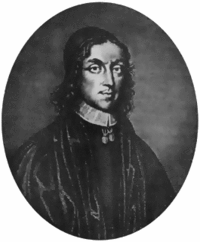Peter Heylin
- Peter Heylin
-
Peter Heylin ou Heylyn (29 novembre 1599[1] - 1662) était un ecclésiastique britannique, connu pour ses idées historiques, politiques et théologiques. Il a repris ses concepts politiques dans ses livres géographiques Microcosmus (1621) et Cosmographie (1657)[2].
Biographie
Il est né à Burford, dans l'Oxfordshire, fils de Henry Heylyn et d'Elizabeth Clampard. À 14 ans, il entre au Hertford College, puis au Magdalen College en 1615, où il a eu son diplôme en 1617. Il a donné des conférences sur l'histoire de la géographie à Magdalen. En 1620, il a présenté sa conférence au Prince Charles, à Theobalds. En 1621, ces conférences sont publiées dans Microcosmos: a Little Description of the Great World, qui s'avère être le plus populaire de ses travaux. D'ailleurs, en 1639, huit éditions ont été produites[1]. À l'université, où il a été surnommé « le dictateur perpétuel », Heylin a été un franc polémiste[1]. Lors de la Restauration, il a été sous-doyen de Westminster, mais sa mauvaise santé l'a freiné dans ses progrès. Il a épousé Letitia Highgate et a une grande famille. Son monument se trouve dans l'abbaye de Westminster.
Notes et références
- ↑ a, b et c Anthony Milton, ‘Heylyn, Peter (1599–1662)’, Oxford Dictionary of National Biography, Oxford University Press, Sept 2004
- ↑ Robert Mayhew, Geography is twinned with divinity; Geographical Review, Vol 90, No 1, January 2000
Catégories :
- Naissance en 1599
- Décès en 1622
- Théologien britannique
Wikimedia Foundation.
2010.
Contenu soumis à la licence CC-BY-SA. Source : Article Peter Heylin de Wikipédia en français (auteurs)
Regardez d'autres dictionnaires:
Peter Heylin — or Heylyn (29 Nov 1599 Anthony Milton, ‘Heylyn, Peter (1599–1662)’, Oxford Dictionary of National Biography, Oxford University Press, Sept 2004] ndash; 1662) was an English ecclesiastic and author of many polemical, historical, political and… … Wikipedia
HEYLIN, PETER — English divine, born at Burford; graduated at Oxford, and in 1629 became chaplain in ordinary to Charles I.; was a zealous champion of the Church of England; forfeited his livings and property during the Puritan ascendency, but was reinstated… … The Nuttall Encyclopaedia
Heylin, Peter — (1600 1662) Ecclesiastical writer, b. at Burford, Oxon., was one of the clerical followers of Charles I., who suffered for his fidelity, being deprived under the Commonwealth of his living of Alresford, and other preferments. After the… … Short biographical dictionary of English literature
Mercurius Aulicus — Peter Heylin, one of the key writers behind the Mercurius Aulicus. Mercurius Aulicus was one of the most important early newspapers in England, famous during the English Civil War for its role in Royalist propaganda. Contents … Wikipedia
Dean and Canons of Westminster — Anglicanism portal … Wikipedia
Tracts for the Times — The Tracts for the Times were a series of 90 theological publications, varying in length from a few pages to book length, produced by members of the English Oxford Movement, an Anglo Catholic revival group, from 1833 to 1841. There were about a… … Wikipedia
List of University of Oxford people in academic disciplines — This is a list of people from the University of Oxford in academic disciplines. Many were students at one (or more) of the colleges of the University, and others held fellowships at a college. This list forms part of a series of lists of people… … Wikipedia
Groß-Simbabwe — Groß Simbabwe* UNESCO Welterbe … Deutsch Wikipedia
History of the Puritans — The history of the Puritans can be traced back to the Vestments Controversy in the reign of Edward VI ending in a decline in the mid 1700s. Background, to 1559 The English Reformation, begun his reign in the reign of Henry VIII of England, was… … Wikipedia
John Birkenhead — Sir John Birkenhead or Berkenhead (March 24, 1616 ndash;4 December, 1679) was a British political writer and journalist, he was imprisoned several times during the Commonwealth for his obtrusive royalism.Birkenhead was educated at Witton Grammar… … Wikipedia

